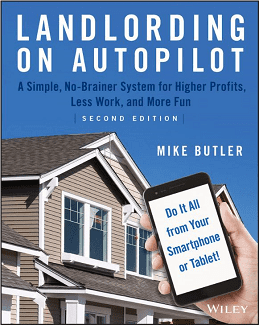How Much is Enough? – Cash Reserves
Landlord on Autopilot by Mike Butler
Odds are, you’ve probably already thought or asked yourself this question after you have jumped into the game of real estate investing. Perhaps you’ve asked other investors, bankers, financial advisors, agents and/or many others. But who are you asking?
When you have questions to ask about your real estate investing business, you must carefully select a qualified, real estate investing expert or two or three. On an extreme note, pretend you own and operate a bakery. Would you ask a barber question about running your bakery? Of course not.

Not only businesses, but reflect a moment on how this “trickled down” to employees, vendors, transportation folks and this touched almost everyone in our economy except for those businesses who sold masks and plexiglass dividers. You probably know many folks affected by this unexpected shut down in our economy and the affects still linger on today for your real estate investing business.
Don’t forget the national campaign of getting on the “Don’t Pay Rent Bandwagon!” If you have rental properties, odds are, this affected your rental business and tapped into your cash reserves.
Replacement windows take six months or more from your order date to arrival date. Lumber prices spiked through the roof and this continues throughout our supply chain.
Let’s get you some variations on some simple answers to how much cash should keep on the backburner.
- Dave Ramsey, famous radio show host and author, tells his listeners to always keep an emergency fund, at least $1,000 for those unexpected expenses that happen in life.
- Jim Gaunt, first President of Fifth Third Bank of Ky, at one time required investors to keep and maintain 10% of their total loan balances owed in a Fifth Third Bank account as one of their conditions to qualify before you could get approved for your next investor loan. For example, if your combined total of all of your Fifth Third loans is $2,300,000, you would have to keep and maintain a minimum balance $230k in cash at 5th 3rd.
- Then you have financial advisors and experts with all kinds of recommendations from no need to have cash on hand and instead have access to cash to keeping a minimum 12 months of expenses as cash reserves.
What should you do? How much cash should you keep on hand as your emergency fund?
Your answer should be realistic and not a theory or concept. The best way to be realistic is to take a serious look and factor in recent events, history, and what you expect to happen in the near future.
Take a look at recent history. The Covid-19 debacle impacted a boatload of investors and many have hit the wall and went belly up. This never happened before series of events slammed investors. First, our economy was shut down. It was weird to drive around town and see perhaps maybe 10% of what the normal traffic would be.
Many businesses were shut down. Employees and tenants job income went to zero along with the many investors who had jobs and/or businesses – they too had their income crashed to zero.
At this point in the beginning, everyone hoped and prayed this was short term. No one expected the financial nightmare to continue even today. Wendy’s by my home closes every day at 3pm due to no help and their dining room is closed. Only the drive-thru is open.
Then you have the eviction moratorium, the foreclosure moratorium along with many other federal, state, and local issues.
Now ask yourself, if this were to happen again, how much cash would you need to “survive?”
Try this simple formula on for size:
STEP 1: Grab a notebook and a sharp crayon and write down ALL of the expenses you have every month. Write down every expense, both your real estate business and your personal expenses including groceries, cell phone bill, gas for your vehicles, etc.
It’s very important you write down every red cent you pay out every month. Don’t leave anything out.
STEP 2: Next, write down all of your income when things are going great including your job/business income and rents from your tenants. Then take your total income number and subtract your total expense number and hopefully you will have a positive number and not a negative number.
STEP 3: Take a look at your total expenses for the month and multiply it by six (6) months. This will be a big ugly number and this should be your guide on the minimum of cash reserves to keep on hand.
This can be a huge challenge to discipline yourself to keep this cash on hand especially if you are growing your investing business. Here’s a simple tip on how you can make this easier to pull off.
Every sharp investor has a self-directed Roth IRA. I highly recommend Carl Fischer’s CamaPlan.com because they have the lowest annual fees. (I still have ROTH IRA accounts with Equity Trust, but their annual fees are too high compared to CamaPlan.com)
Your annual contributions to your self-directed Roth IRA are made from your “after tax dollars” meaning you have already paid income tax on your contribution money. The ROTH IRA begins with your already paid income tax contribution and all of your profits are tax free vs. the traditional IRA where your contributions are tax deferred resulting in you having to pay income tax on all of your profits.
Here’s your magic. Your self-directed Roth IRA is like having the “ultimate savings account.” If you are old enough to remember, growing up our parents encouraged us to open a “savings account” at our local bank. In order to withdraw any money from your savings account, you had to physically go to the bank and fill out a withdrawal slip. This was a lot more cumbersome than your checking account.
Well guess what? Your self-directed Roth Ira is just like but a lot safer for you. Continue to make the maximum allowable contribution every year for your Roth and your spouse’s or partner’s Roth.
Because you have already paid income tax on the monies you contribute to your Roth every year, your contributions can be treated just like, even better than old school savings accounts.
- For example, assuming you have a spouse and/or partner and each of you contribute maximum $6,000 ($7,000 if you are 50 or older) ever year, after 5 years your total contribution would be $30k each X 2 people = $60,000 cash that you can withdraw with no penalty, no interest, no harm, no foul. Why, how can you do this? Remember, you have already paid your income tax on your contributions!! If you are 50-year-old or more, your combined total is $70,000.
I am NOT encouraging you to deplete your cash contributions in your Roth. This is just an extra strategy to help you maintain your 6 months of expenses as your cash reserve to survive unexpected loss of income.
Another not well-known strategy involves life insurance. I’m not an expert on life insurance other than paying my monthly premium, but I’ve learned and observed over the years where investors can “borrow” money from their life insurance policy at a low interest rate. As you make payments with interest back to your life insurance policy, your life insurance policy gets to keep the interest growing your cash value.
Some investors have used this strategy on their parents’ life insurance policies. You must find an expert on these insurance strategies who can hold your hand and walk you through the process properly. If this interests you, start with your life insurance agent.
Unlike HELOCs, lines of credit, credit cards, etc. can be closed and shut down by the lender when our economy takes a hit. Don’t rely on those as access to cash. Even if you pull out the maximum cash on those items, many lenders have called total balance due now when those accounts are shut down. What a mess.
Your self-directed Roth IRA and the insurance strategy cannot be shut down or closed. Remember, LIFE does NOT have a pause or rewind button!
It’s up to you to make it happen.
About the Author


Mike’s investing success has been featured in Money magazine’s featured article “Can Real Estate Make You Rich?” and The Wall Street Journal Radio network with over 170 syndicated radio shows.















 Accessibility
Accessibility